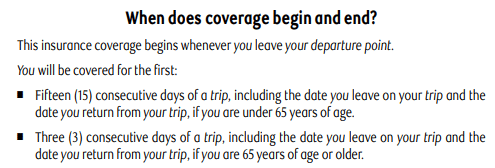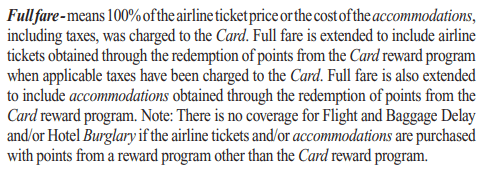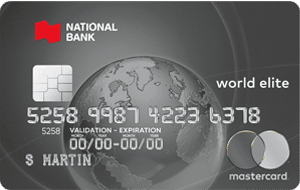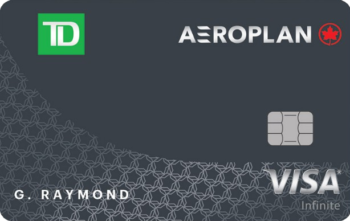Travel insurance is one of those things you hope you’ll never need—but when you do, it can save you from a financial nightmare. Whether it’s flight delays, baggage delays, trip cancellation or interruption, or even medical emergencies abroad, having the right credit card coverage can make all the difference.
However, a common belief is that credit card travel insurance only applies if you pay for the trip in full using that card. But what if you’re using points and miles? Do you still get coverage on an award ticket?
The short answer: it depends on the card and the type of insurance. Some benefits like emergency medical coverage apply automatically, while others require you to charge at least part of the trip to your card.
Let’s take a closer look at credit cards that offer insurance for award travel.
In This Post
Emergency Medical Insurance: Just By Being a Cardholder
One of the biggest perks of premium travel credit cards is emergency medical insurance. The good news? You don’t have to pay for your trip with the card for this coverage to apply.
Most credit cards that offer emergency medical insurance cover you simply by being an active cardholder and travelling outside your province or territory of residence. The coverage typically applies for trips up to a set number of days—usually 15–25 days for those under 65, and significantly fewer for older travellers.
For example, the Amex Platinum Card’s insurance pamphlet states that it provides emergency medical coverage for trips up to 15 days if under 65.

The RBC Avion Visa Infinite’s pamphlet says that it covers cardholders for 15 days for if under 65, and three days if 65 or older.

And the Scotiabank Passport Visa Infinite Card’s benefits booklet states that it offers 25 days of coverage if under 65, and three days if 65 or older.

As you can see, travelling outside of your province or territory of residence is all that’s required for the emergency medical insurance to kick in, and there’s no requirement for the trip’s costs to be charged to the card itself.
This is the case for almost every card out there that includes medical insurance, including the American Express Gold Rewards Card, the American Express Cobalt Card, the CIBC Aventura Visa Infinite Card, and the WestJet RBC World Elite Mastercard, amongst others.
This means that no matter how you booked your travel—whether you paid cash, used Aeroplan points, or stitched together a multi-airline trip using various rewards—you’re still covered for medical emergencies, as long as you keep one of these premium travel credit card open.

That said, make sure you carefully read the insurance pamphlet on your credit card, since there are always certain exclusions to which the medical coverage wouldn’t apply. Most often, preexisting medical conditions or undertaking risky activities will void the coverage.
Moreover, note that the coverage typically only lasts for a certain number of days on your trip, so you may still need to purchase additional insurance if you’re travelling for a longer duration. You can do this by topping-up your credit card coverage or purchasing a policy from a separate provider.
Other Types of Travel Insurance: Use the Right Credit Card
Now, while most premium credit cards provide travel medical insurance to their cardholders regardless of whether the trip was billed to the card, the same generosity is usually not extended to other types of insurance.
To be eligible for coverage for flight delays, baggage delays, trip cancellation & interruption, or travel accident insurance, you’ll most likely need to have booked the trip and paid at least 75% of the portion with the credit card. This can be an issue for anyone who primarily travels on award tickets, as a flight that’s paid for with miles can’t really be charged “in full” to any card at all.
Thankfully, that’s where a few select credit cards on the market can fill the gap.
Aeroplan Co-Branded Credit Cards
Aeroplan co-branded credit cards extend travel insurance benefits to any trips booked using Aeroplan points, as long as the associated taxes and fees are billed to the card.
There are currently 11 Aeroplan co-branded credit cards available in Canada, issued by TD, CIBC, and American Express.
For example, here’s what the TD Aeroplan Visa Infinite Card’s insurance package has to say about ticket eligibility for flight delay, delayed and lost baggage, trip cancellation and trip interruption, and common carrier accidents:

And here’s the equivalent language on the American Express Aeroplan Reserve Card‘s insurance pamphlet:

As you can see, the insurance benefits on these cards will apply no matter whether you charged the full fare to the card, redeemed Aeroplan points for the ticket and charged the taxes and fees to your credit card, or redeemed a hybrid amount of Aeroplan points and cash using the Points + Cash feature.
Therefore, whether you’re redeeming Aeroplan points for a quick one-way flight or a complex trip and you want to enjoy the full insurance protection of a premium travel credit card on your trip, then it’s best to put the taxes and fees onto one of Amex, TD, or CIBC’s Aeroplan-affiliated cards.
And if you regularly travel on Aeroplan points, you might find it worthwhile to continuously keep one of these cards open for the purpose of giving yourself some peace of mind along your points-funded trips.
Credit Cards with Other Loyalty Programs
Most Canadian credit cards that have a loyalty program associated with them will typically extend their insurance benefits to travel booked through that specific points program as well. A few examples are as follows:
-
The Amex Gold Rewards Card, Platinum Card, and Cobalt Card extend insurance benefits to travel booked directly via the Membership Rewards program (excluding transfer partners).
-
The RBC Avion Visa Infinite Card extends its insurance benefits to travel booked directly using RBC Avion points (excluding transfer partners).
-
The WestJet RBC World Elite Mastercard extends its insurance benefits to travel booked fully or partially using WestJet points.
-
The Scotiabank Passport Visa Infinite Card extends its insurance benefits to travel booked with Scene+ points.
Therefore, whenever you’re looking to redeem one of the major Canadian points currencies for a flight, you’ll usually be able to take advantage of the insurance perks on whatever credit card is associated with that points program (which is probably the card that you had used to earn the points to begin with).
And if that plan doesn’t work out for some reason, you can always charge the remaining balance to another card as a fallback option…
A Credit Card That Covers All Reward Bookings
In Canada, the National Bank® World Elite®Mastercard® is the lone credit card that covers all reward bookings.
The insurance coverage for the National Bank® World Elite® Mastercard® doesn’t mandate that the full cost of the trip be charged to the card, but rather only requires that a “portion or the entire cost of the trip” is charged to be sufficient for coverage.

This means that whenever you’re redeeming any type of rewards currencies for a flight, be it with Aeroplan points, Cathay Pacific Asia Miles, Alaska miles, Air France/KLM Flying Blue miles, or Ethiopian Airlines ShebaMiles, you’ll be eligible for insurance coverage with the National Bank® World Elite® Mastercard®, since you’re fulfilling the criterion of “partial cost” in doing so.
This card’s far-reaching insurance proposition is one of the reasons why you might wish to pick it up and/or hold onto it in the long term.

Conclusion
If you primarily travel on points, you don’t have to sacrifice insurance protection—you just need the right credit card.
Emergency medical insurance is generally active as long as you’re traveling out-of-province and your card account is in good standing. Meanwhile, using a co-branded credit card through TD, CIBC, American Express, or RBC can usually take care of the remaining types of coverage.
For those who want the ultimate peace of mind, the National Bank® World Elite® Mastercard® stands out as the best choice, offering insurance protection on any award booking, regardless of the loyalty program used.
Whether you’re a seasoned points collector or just getting started, making sure you have the right credit card in your wallet can help ensure your travels go smoothly, even when the unexpected happens.




















Does Desjardins VIP still cover all award travel with its insurance?
This article should be updated as BMO AM WE MC no longer extend insurance coverage if the cost is partially charged to this card except for travel purchase with AM.
Any comments on US cards and if there are any good ones to use when booking a reward flight.
Where are you seeing that the National Bank World Elite Mastercard has coverage on all award bookings? My review of the certificate of insurance doesn’t show anything
“Trip cancellation or delay (up to $2,500 per insured): In the event of a trip cancellation or delay before departure, the following expenses will be reimbursed, provided that a portion or the entire cost of the trip was charged to the account”
Thanks Ricky. My error stemmed from defaulting to the car rental section, which is the only insurance type that has different conditions:
“Covered Items and Risks
Eligible vehicle rental by the cardholder, paid for entirely with the card or rewards points earned with the card. Coverage applies anywhere in the world except locations where this coverage is prohibited under local law or rental agency policy.”
How come the BMO Cash Back World Elite isn’t covered in this? It has the same insurance coverage as the other two WE cards
What if I use air Canada gift cards for 80% of the fair + 20% on an AC cobranded Credit card. Will the insurance kick in ?
Should have reviewed this page before booking a flight with the 50% miles back sale with Aeroplan… Paid the remaining taxes with my HSBC World Elite, thinking I would be covered, but the definition of a Ticket is "… evidence of fare paid for travel on a Common Carrier, which has been charged in full to the Account". I guess once this is done, there is no way of turning back and charge it against another card? What if I made a seat selection (with a fee) and paid that with a TD Aeroplan card, would that work?
I doubt it Mark, as a seat selection fee isn’t part of the fare. However, if it’ll give you the peace of mind, you can still cancel for no charge and rebook under the 50% Miles Back sale right now and pay the taxes with your TD Aeroplan.
Hmm I might be in a pickle, mostly concerning AP as I do not have any AP credit cards and have been using my AMX or Avion to pay for the leftover charges after a point redemption. In the event of a major delay/cancellation/baggage lost I guess AMX/Avion is useless, but I will have to see what the T+C state during the flight redemption process. I am hoping that covers a solution where the carrier can rebook alternate flights or cover costs out of my own pocket. Same thing with if I used a foreign rewards program like Avios or Kris since none of my cards cover those kinds of redemption for these interruptions.
This can make things a bit messy, almost as if out of necessity I need to have an AP or BMO card just to pay for these redemption fees in order to be properly protected. I don’t even know if bank’s travel insurance programs even include interruptions via flight redemption/points bookings.
Nicely done, def gave some serious thinking especially how it may affect my mini RTW plans.. 🙁
You can always purchase some additional trip insurance through a third-party provider like Manulife or Allianz. Might be worth the peace of mind if you don’t happen to have one of those cards at the moment.
Do you think you still need the card active by the dates of travel for the insurance to be effective?
Yes!
I think Desjardins odyssey card series also have same effect as BMO WEMC and annual fee is less.
The BMO Air Miles World Elite Mastercard is only $120 and comes with the generous insurance policy so it’s only a difference of $10 vs the Odyssey Gold.
Furthermore the card’s insurance policy says "The fees must have been paid using the credit card." I’m not sure if this is a something lost in translation or rather a case where insurance eligibility depends if just the fees were charged to the card.
Do you know if the rental car insurance on any credit cards covers rentals where part of the total was covered by that rental company’s loyalty points?
Hi Ron,
Funny you should ask that, most of the insurance certificates actually have a provision for this. The majority of policies have something along the lines of "if all of the previous car rentals used to earn the rental company’s loyalty points were charged to the card, the free rental will qualify for CDW".
What stands apart is BMO’s coverage which uses the "full or partial cost" phrase to describe eligibility. I’m not sure if the agencies charge some kind of fee to use the free rental, but if there’s at least $0.01 charged to a BMO card with CDW insurance, you should be covered.
I’m wondering does all this insurance also cover your travelling companion/spouse or do they have to be using their own credit card as well?
Hi Herb,
Typically medical insurance covers the spouse and any dependents while interruption / cancellation covers traveling companions (so it would extend to your spouse) if the full trip is charged to the card. Many of the interruption / cancellation benefits come into effect if your travel companions become unwell and you need to adjust your trip to take care of them so it makes sense that insurances should extend.
Your best bet is to check the insurance certificates, Ricky linked them above for the cards he covered and you should be able to find yours on the bank websites.
It’s worth noting that most of these cards are not “first-payer” and that can eat into your lifetime maximum for your regular extended health insurance (if you have it).
Unfortunately it seems like most travel insurances sold have this clause (CAA, Blue Cross, RBC). I think the only way to avoid this is to buy travel insurance from the same extended benefits insurance company (which isn’t necessarily the cheapest option). Another good choice would be to add on travel insurance as part of extended health benefits, often times a multi-trip plan can be added on for minimal additional cost and wouldn’t affect the lifetime maximum.
Excellent article Ricky! I’ve been bailed out by the RBC WestJet insurance for a major trip delay, 24h due to mechanical delays, the card covered the purchase of tickets on AC to get home right away. There’s nothing worse than thinking you have coverage and finding out you don’t when it matters. Great points about the BMO cards and their blanket coverage.